
The politics of Russia take place in the framework of the federal semi-presidential republic of Russia. According to the Constitution of Russia, the President of Russia is head of state, and of a multi-party system with executive power exercised by the government, headed by the Prime Minister, who is appointed by the President with the parliament's approval. Legislative power is vested in the two houses of the Federal Assembly of the Russian Federation, while the President and the government issue numerous legally binding by-laws. Since the collapse of the Soviet Union at the end of 1991, Russia has seen serious challenges in its efforts to forge a political system to follow nearly seventy-five years of Soviet governance. For instance, leading figures in the legislative and executive branches have put forth opposing views of Russia's political direction and the governmental instruments that should be used to follow it. That conflict reached a climax in September and October 1993, when President Boris Yeltsin used military force to dissolve the parliament and called for new legislative elections. This event marked the end of Russia's first constitutional period, which was defined by the much-amended constitution adopted by the Supreme Soviet of the Russian Soviet Federative Socialist Republic in 1978. A new constitution, creating a strong presidency, was approved by referendum in December 1993.
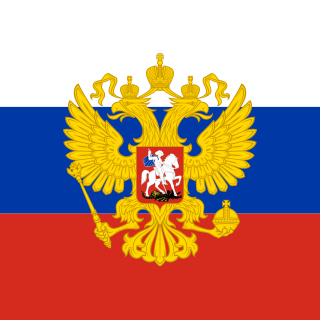
The president of the Russian Federation is the supreme head of state of the Russian Federation, as well as the commander-in-chief of the Russian Armed Forces. It is the highest office in Russia.

Dmitry Anatolyevich Medvedev is a Russian politician who has been serving as the deputy chairman of the Security Council of Russia since 2020. Medvedev also served as the president of Russia between 2008 and 2012 and prime minister of Russia between 2012 and 2020.

The 2008 Russian presidential election was held on 2 March 2008, and resulted in the election of Dmitry Medvedev as the third President of Russia. Medvedev was elected for a four-year term, whose candidacy was supported by incumbent president Vladimir Putin and five political parties, received 71% of the vote, and defeated Gennady Zyuganov of the Communist Party of the Russian Federation, and Vladimir Zhirinovsky of the Liberal Democratic Party of Russia.
2008 presidential election may refer to:
A truth commission, or truth and reconciliation commission, is tasked with discovering and revealing past wrongdoing by a government.
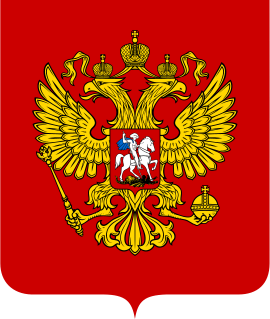
The State Award System of the Russian Federation has varied and distinct origins. The first being pre-1917 orders of the Russian Empire re-established after the 1991 dissolution of the Soviet Union, the second is from former Soviet orders that were slightly modified and retained post 1991, we also find many completely new awards resembling Imperial awards in basic design since the reintroduction of Russian heraldry.
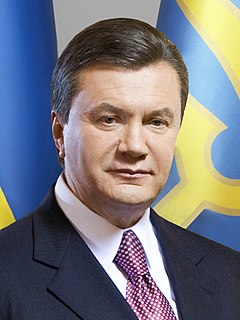
Presidential elections were held in Ukraine on 17 January 2010. As no candidate received a majority of the vote, a run-off election was held between Prime Minister Yulia Tymoshenko and opposition leader Viktor Yanukovych on 7 February.

The Russian Ecological Party "The Greens" is a green political party in the Russian Federation. It was founded in 1992 as the Constructive-Ecological Movement of Russia "Kedr". In 2002 the party was transformed into the Russian Ecological Party "The Greens". The party endorsed Vladimir Putin in the 2018 Russian presidential election.

The 2016 United States presidential election was the 58th quadrennial presidential election, held on Tuesday, November 8, 2016. The Republican ticket of businessman Donald Trump and Indiana governor Mike Pence defeated the Democratic ticket of former secretary of state Hillary Clinton and the United States senator from Virginia Tim Kaine, in what was considered one of the greatest upsets in American history. Trump took office as the 45th president, and Pence as the 48th vice president, on January 20, 2017. It was the fifth and most recent presidential election in which the winning candidate lost the popular vote. It was also the sixth and most recent presidential election in which both major party candidates were registered in the same home state, with the others being in 1860, 1904, 1920, 1940, and 1944.
The Presidential Commission of the Russian Federation to Counter Attempts to Falsify History to the Detriment of Russia's Interests was a commission in the Russian Federation that was set up by a decree issued by president Dmitry Medvedev on 15 May 2009, officially to "defend Russia against falsifiers of history and those who would deny Soviet contribution to the victory in World War II". The commission was headed by Medvedev's Chief of staff Sergey Naryshkin. The decree establishing the commission was invalidated on 14 February 2012, and the commission thus ceased to exist. The commission has been described as a further regress toward Soviet and Stalinist practices, glorifying the Soviet Union and its crimes.

The Medvedev modernisation programme was an initiative launched by President of Russia Dmitry Medvedev in 2009, which aimed at modernising Russia's economy and society, decreasing the country's dependency on oil and gas revenues and creating a diversified economy based on high technology and innovation. The programme was based on the top 5 priorities for the country's technological development: efficient energy use; nuclear technology; information technology; medical technology and pharmaceuticals; and space technology in combination with telecommunications.

Snap presidential elections held in Ukraine on 25 May 2014 resulted in Petro Poroshenko being elected President of Ukraine. Originally scheduled to take place on 29 March 2015, the date was changed following the 2014 Ukrainian revolution. Poroshenko won the elections with 54.7% of the votes, enough to win in a single round. His closest competitor, Yulia Tymoshenko, emerged with 12.81% of the votes. The Central Election Commission reported voter turnout over 60%, excluding the regions not under government control. Since Poroshenko obtained an absolute majority in the first round, a run-off second ballot was unnecessary.

The 2012 Russian presidential election was held on 4 March 2012. There were five officially registered candidates: four representatives of registered parties, and one nominal independent. The election was the first one held after constitutional amendments were introduced in 2008, in which the elected president for the first time would serve a six-year term, rather than a four-year term.
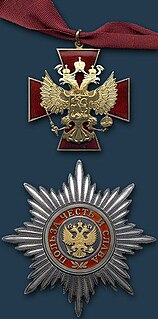
The Order "For Merit to the Fatherland" is a state decoration of the Russian Federation. It was instituted on 2 March 1994 by Presidential Decree 442. Until the re-establishment of the Order of St. Andrew in 1998, it was the highest order of the Russian Federation. The order's status was modified on 6 January 1999 by Presidential Decree 19 and again on 7 September 2010 by Presidential Decree 1099.

The 2018 Russian presidential election was held on 18 March 2018.

The 2019 Ukrainian presidential election was held on 31 March and 21 April in a two-round system.

Russian presidential elections determine who will serve as the President of Russia for the next six years.
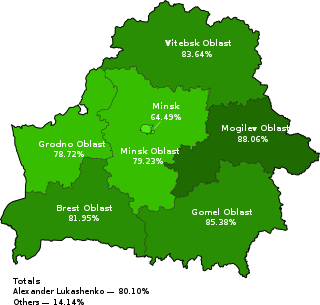
Presidential elections were held in Belarus on Sunday, 9 August 2020. Early voting began on 4 August and ran until 8 August.

Sergei Leonidovich Tikhanovsky or Siarhiej Leanidavič Cichanoŭski is a Belarusian YouTuber, video blogger, dissident and pro-democracy activist. He is considered by Amnesty International to be a prisoner of conscience. He is known primarily for his activism against the government of Belarus's long-serving president, Alexander Lukashenko. In May 2020, he announced his intention of running for the 2020 presidential election, but he was arrested two days after the announcement, and his wife Sviatlana Tsikhanouskaya then ran in his stead as the main rival to Lukashenko in the contested election.
















